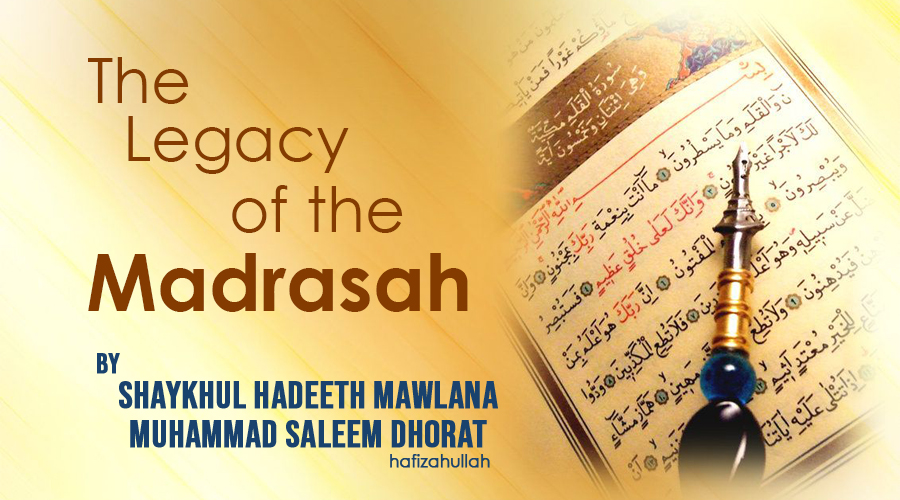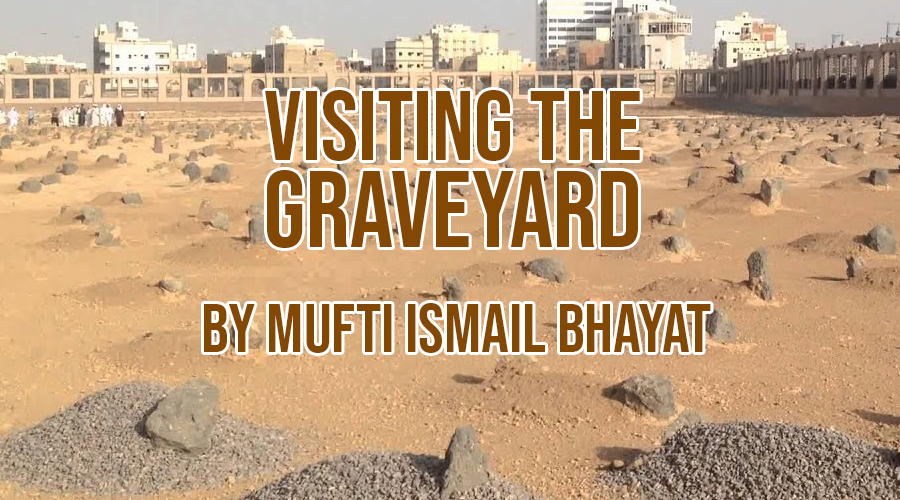
Madrasah- A Legacy
Our children attend madrasahs every evening, yet we as their parents do not attach much significance to them, regarding them merely as places that look after the ummah’s infants. We hold them on a par with nurseries, as places of elementary learning. We should realise though, that as long as we fail to attach importance to them, we will remain ignorant of our children’s development and progress.
The Madrasah’s Legacy
The madrasah is not an insignificant institute. The flame of Īmān (faith) is first kindled in the madrasah. The light of Īmān first permeates the heart of a Muslim child in this environment. It teaches our young children moral values.
It is in the madrasah where we learned that to lie is a very great evil and that we should always speak the truth. It warned us against the use of bad language and that stealing, cheating and oppressing people are wrong. The madrasah taught us not to be a thorn in the side of our parents and to care for the elderly, orphans and widows. It was in the madrasah that we learned that we should be kind to our neighbours, be they Muslim or non-Muslim.
The madrasah even taught us things that we do as adults without paying attention to them, like the simple yet rewarding act of removing an obstacle from a path. The good morals and character we take credit for as adults were acquired through the madrasah.All the teachings we are familiar with and today practice in our lives spring from there. By taking stock of every good deed we are performing and every evil that we detest and avoid, we will be witnessing the legacy of the period of our lives between the age of four or five up to thirteen or fourteen: the years spent in the madrasah.
Madāris Benefit the Nation
The madrasah not only brings our children benefits in relation to the hereafter, it also provides them goodness in this world. Parents too, receive worldly gain: a child that spent its time well at madrasah will become a means of comfort and joy for its parents. The madrasah is a boon for the country as well because it produces good citizens, regardless of whether it operates in an Islamic country or a secular state. At madrasah, children are taught to respect the rights of all people and are warned against involvement in drugs, alcohol, theft, vandalism and all types of antisocial behaviour. It contributes towards a socially cohesive society and is a great blessing for humanity as a whole.
Prophet Muḥammad s came into this world as a mercy and all his teachings are full of mercy. What is taught in the madrasah is what the Prophet Muḥammad s taught. His life, his character, his dealings – they all form the basis of what our children learn. Every child who attends a madrasah becomes familiar with these Prophetic teachings and is equipped to go on to embody them and serve humanity and work for its betterment.
Parents’ Responsibilities Towards their Children
In order for a child to get the most out of his/ her madrasah education, parents need to work in partnership with the madrasah. Parents should not hand over their children to the madrasah and feel that they have fulfilled their share of educational responsibility. Some parents are content with just enrolling their children in any madrasah, but even those that take the time to find one that offers the best ta‘līm (education) and tarbiyah (upbringing) should not feel that after enrolling their child their duty has ended.
It is the parents who will be questioned by Allāh S about their children’s education. If the teachers, principal or the management committee failed in fulfilling their responsibilities, they will also be held accountable for their actions, but the parents will be questioned and held primarily responsible for any negligence regarding their children Allāh S will demand the answers to two questions from every parent concerning their child: what ‘ilm (sacred knowledge) did they give him and what ādāb (good manners/social etiquettes) did they teach him? Each mother and father will have to answer for each one of their children. And at that moment, no parent will be able to blame the child’s teacher or madrasah chairman.
It is the parents’ duty to give the correct ta‘līm and tarbiyah to their children. They cannot exonerate themselves from it. In light of this, the parents have to keep a close watch on the performance of their children. In the case of a madrasah not fulfilling its responsibility of educating and nurturing their children, parents should voice their concerns. And if the parents’ concerns are not addressed adequately then they should remove their child and enrol him or her in another madrasah. It is just like when a child becomes sick and we take him to a doctor; we check the progress of the child and if we feel he is not receiving adequate treatment, we talk to the doctor. If, after a couple of such discussions, the condition persists and it seems pointless talking to the doctor any further, we look for a better doctor. Just as the parents are responsible for their child’s physical treatment, they must shoulder the responsibility of their religious upbringing and education too.
Partnership Between Parents And The Madrasah
Parents should also cooperate with the madrasah and try to understand its aims and objectives. If a madrasah emphasises punctuality and regular attendance, with few breaks in between, parents should cooperate. For instance, if the board of scholars or committee of a particular madrasah consider it necessary to decrease holidays to allow enough hours to complete the curriculum, parents should ensure the attendance of their child. The people responsible are aware that if they allow longer holidays, the end result will be academic, religious and social underachievement. Therefore parents should cooperate with the madrasah; a vast amount of time and effort is spent in deciding what is best for our children.
Being involved with both the madrasah and dārul ‘ulūm educational systems, I am of the opinion that it is the madrasah more than the dārul ‘ulūm that is of crucial importance to the Muslim community, since ninety percent of Muslim children will pass through it. Not every Muslim child will participate in tablīgh jamā‘ah, associate himself to a shaykh for spiritual guidance, sit in the company of the ‘ulamā or pursue studies at a dārul ‘ulūm. However, nearly every child will study at a madrasah. This fact is enough for us to understand the primary importance of the madrasah system in educating our children to become good Muslims who will serve as role models for our society.
Therefore we all must work together: the principal, the teachers and the parents. Cooperation will enable us to build a secure future for our coming generations, in which the masājid will continue to be attended, the Dīnī environment we take for granted now will be maintained and society at large will continue to benefit from good citizens. Our children are the future. May Allāh S assist, bless and guide us in this noble task. Āmīn



